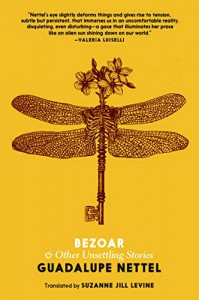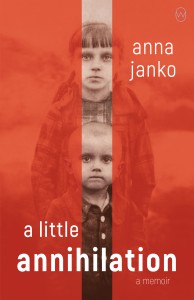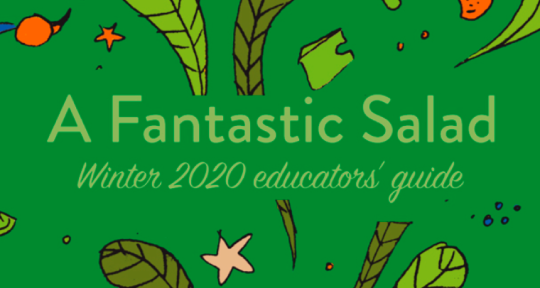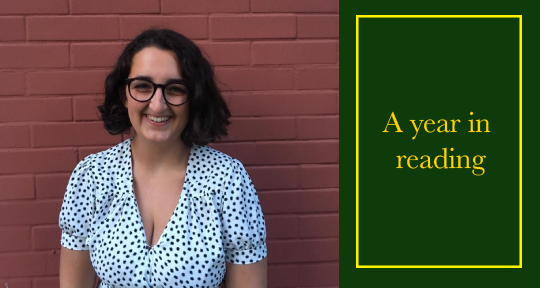This month’s selections of newly translated world literature seem to revolve around the unknown, be it to uphold or dispel it: a Mexican short story collection explores its protagonists’ dark psyches while providing no easy answers, a piece of Polish reportage rediscovers lost voices on nineteenth- and twentieth-century immigrant experience in America, and a Brazilian novel hilariously tackles a group of friends’ exploits in almost unchartered digital territory during the nineties.

Bezoar: And Other Unsettling Stories by Guadalupe Nettel, translated from the Spanish by Suzanne Jill Levine, Seven Stories Press, 2020
Review by Samuel Kahler, Communications Director
Unusual as they may be, the strange and wistful short fictions in Guadalupe Nettel’s Bezoar: And Other Unsettling Stories are not only clever in their portrayal of human desire and obsession; they are often wise as well. Nettel, an acclaimed Mexican author, was named as one of the Bogotá 39 and is a recipient of the largest Spanish-language short story collection prize, the Premio de Narrativa Breve Ribera del Duero. Bezoar is her second collection of stories, published in the original Spanish in 2008 and now translated into English by Suzanne Jill Levine.
Over the course of the book, Nettel and her characters have something fresh to reveal about their unique obsessions and secrets (the stories are told from the first-person perspective). But at just over one hundred pages, Bezoar is an all-too-brief journey through the grey areas and dark recesses of hidden passions, lusts, and compulsions.
Depending on one’s subjective definition, the narrators of Bezoar might be considered everyday people who, at face value, live quiet, unremarkable lives: a photographer in Paris, a man strolling through Tokyo’s botanical gardens, a teenager on a summer vacation, and—yes—a voyeur here, a stalker there, and one supermodel under psychiatric supervision. While memorable and idiosyncratic, these are not outsized characters with grand schemes; instead, they look inward and act in near-singular pursuit of resolving psychological issues. Fittingly, their stories are intimate chamber pieces that delight in the details of unfulfilled needs and wants, emotional attachments and detachments, and traces of personal insight that at times reflect a broader general truth about human dissatisfaction. READ MORE…










Translation Tuesday: “Marigô” by Cidinha da Silva
“Can I call you marigô, too?”
A lexical misunderstanding leads to a hilariously awkward exchange in Cidinha da Silva’s “Marigô,” our selection for this week’s Translation Tuesday. “Marigô” is an exemplar of the crônica form, a uniquely Brazilian genre of journalistic writing that combines slice-of-life anecdotes with (often ironic) social commentary. Cidinha da Silva, one of Brazil’s most dynamic and prolific contemporary writers and cronistas, utilizes the third-person present tense to capture the conversational nature of the form, mimicking the complex rhythm and set-up of a joke. Here the punchline not only provides laughs, but also a wry statement on Afro-Brazilian identities and the cultural importance of language.
Samantha worships her friend Dandara—for her beauty, her culture, her intelligence, her knowledge of the world, and, above all, her integrity of purpose. Samantha views Dandara as an activist even when talking with her mother on the phone. Every time Dandara calls—which isn’t just once a day—she greets her mother with an “Oi oi oi, Marigô, calling just to say hello!”
Samantha’s face lights up every time. Somehow she got it in her head that Marigô meant “mother” in Yoruba. At home, she wrote down the word in her small dictionary-diary, where she’s been recording the African words that circulate daily in Brazil. She has a ton already—it’s just a matter of finding the right time to start using them in her stories. Dandara thinks her co-worker is an Afro-nut, the kind of person who wants to transform anything and everything into an episode of African rebirth.
On Dandara’s birthday, her mother decides to surprise her and shows up at her work to take them to Rhinosaurus’s, her daughter’s favorite fast food joint. While waiting for her daughter in the parking lot, she amusingly reads Barack Obama’s biography. Samantha ends up leaving work before Dandara; when she sees two black hands behind a steering wheel holding a copy of the biography of the president of the United States, she goes Afro-nuts. Only a fascinating person would read such a book, she thinks. She has to introduce herself, has to get to know that woman so she can soak up all of her knowledge. READ MORE…
Contributors:- Ana Luiza de Oliveira e Silva
, - Daniel Persia
; Language: - Portuguese
; Place: - Brazil
; Writer: - Cidinha da Silva
; Tags: - anecdotes
, - Brazilian literature
, - Journalism
, - social commentary